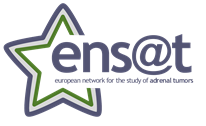-
-
-
-
-
-
-
-
adrenocortical carcinomas (acc)
-
-
-
-
-
-
-
-
-
-
european network for the study of adrenal tumors

Adrenocortical Carcinomas
Adrenocortical carcinoma (ACC) is a rare malignancy with incompletely understood pathogenesis and poor prognosis. Patients present with hormone excess (e.g. virilization, Cushing's syndrome) or a local mass effect (median tumour size at diagnosis > 10cm).
Tumours typically appear inhomogeneous in both computerised tomography and magnetic resonance imaging with irregular borders, and differ from benign adrenal tumours by their low fat content. Hormonal analysis reveals evidence of steroid hormone secretion by the tumour in the majority of cases, even in seemingly hormonally inactive lesions.
Histopathology is crucial for the diagnosis of malignancy and may also provide important prognostic information. In stages I -III open surgery by an expert surgeon aiming at complete resection is the treatment of choice. Local recurrence is frequent, particularly after violation of the tumour capsule. Surgery plays also a role in local tumour recurrence and metastatic disease.
In patients not amenable to surgery, mitotane (a drug specifically killing cells of adrenocortical origin) remains the treatment of choice. Monitoring of drug levels (therapeutic range 14 - 20 mg/l) is mandatory for optimum results. In advanced disease, the most promising therapeutic options (etoposide, doxorubicin, cisplatin plus mitotane and streptozotocin plus mitotane) are currently compared in an international phase III trial. Adjuvant treatment options after complete tumour removal (e.g. mitotane, radiotherapy) are urgently needed, as postoperative disease free survival at five years is below 50%.
International cooperations like ENS@T and trials provide important new structures for patients, but also for researchers aiming at systematic and continuous progress in ACC. Future advances in the management of ACC will depend on a better understanding of the molecular pathogenesis facilitating the use of modern cancer treatments (e.g. tyrosine kinase inhibitiors).
In May 2005, the ACC working group of ENS@T has proposed standards for the diagnostic procedures in patients with suspected or established diagnosis of ACC (see table). Although the formal evidence level for this proposition is low, it provides guidance in this difficult clinical situation.
| Hormonal work up | |
|---|---|
| Glucocorticoid excess (minimum 3 out of 4 tests) |
|
| Sexual steroids and steroid precursors |
|
|
Mineralocorticoid excess |
|
| Exclusion of a phaeochromocytoma |
|
| Imaging | |
|
|
| Staging during follow-up | |
|